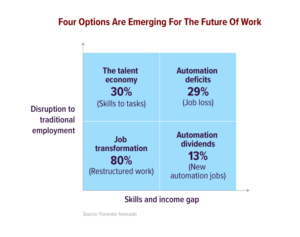Forrester: The Future Of Work Is Dynamic And Adaptive
A pragmatic view of working in a world of intelligent automation
Cambridge, Mass., June 27, 2019 — Forrester released its guide to the future of work, which gets beyond the hype and provides a pragmatic view of the future of work; what it means to leaders, employees, customers, and companies; and what leaders can do now to prepare for intelligent technologies and an automated workplace.
Intelligent automation — the tools including AI and robotics — is the next multiplying force that will shape how consumers and workers accomplish daily tasks. Automation will have implications in four main areas related to the future of work:
- Impact on jobs: Human-touch workers, cross-domain knowledge workers, teachers/explainers, and digital elite jobs will grow. Single-domain knowledge workers, physical workers, function-specific knowledge workers, location-based workers, coordinators, and cubicle jobs will shrink. According to Forrester, that will translate to job losses — 29% by 2030 with only 13% job creation to compensate.

- Impact on economic opportunity and disparity: Automation will exacerbate income disparity, as dividends shift to digital-savvy leaders and negatively impact non-digital workers unable to skill up fast enough.
- Impact on global markets: Outsourcing and evolving supply chains have favored low income economies able to match skill level and capacity to global needs. Automation disrupts offshoring and applies additional pressure on economies to build domestic demand that is able to counter-balance changing global demand.
- Impact on how work is done: Work will depend on a symbiotic relationship between man and machine. This is not a man-led, machine-do structure; instead, it will match leadership, decisioning, and execution tasks across robots and humans that best deliver the desired outcome.
Automation’s impact to the future of work will be both sweeping and sensible, but these changes can place unprepared leaders on their heels or put companies in peril. Companies should examine how they manage their automation portfolio, prepare and hone leadership skills, maximize employees’ value, build robotics quotient (RQ), and can create a learning enterprise to prepare for the future of work.
Additional Resources
- Download Forrester’s complimentary guide to learn more about the future of work.
- Read Invisible Robots In The Quiet Of The Night: How AI and Automation Will Restructure the Workforce by Forrester analyst, Craig Le Clair.
- Explore Forrester’s latest thinking on automation and intelligent technologies.
About Forrester
Forrester (Nasdaq: FORR) is one of the most influential research and advisory firms in the world. We work with business and technology leaders to develop customer-obsessed strategies that drive growth. Forrester’s unique insights are grounded in annual surveys of more than 675,000 consumers and business leaders worldwide, rigorous and objective methodologies, and the shared wisdom of our most innovative clients. Through proprietary research, analytics, custom consulting, exclusive executive peer groups, learning offerings, and events, the Forrester experience is about a singular and powerful purpose: to challenge the thinking of our clients to help them lead change in their organizations.